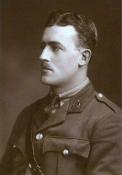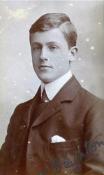
|
The King's School Canterbury |
Roll of Honour |
| Captain John DEIGHTON | |
|
Royal Army Medical Corps attached to the 1/5th Battalion King's Own (Royal Lancaster) Regiment Date of birth: 28th June 1887 Date of death: 19th September 1916 Died of wounds aged 29 Buried at Heilly Station Cemetery Mericourt-L'Abbe Plot IV Row F Grave 19 |

|
| He was born at Cambridge on the 28th of June 1887 the third son of Lieutenant Colonel Frederick Deighton MB, Royal Army Medical Corps, and Louisa Ellen (nee Fisher) of 'Little St Bernard's' 47, Hills Road Cambridge. He was educated at St Faith's School, Cambridge and at the King's School Canterbury from September 1901 to July 1906 where he gained a Junior Scholarship in July 1903 and a Senior Scholarship in July 1905. He was appointed as a monitor in 1904 and was a member of the Rugby XV in 1904/5. A daring climber, he was known to slip out at night to climb the Bell Harry Tower and claimed to have reached the top in under fifteen minutes. He went on to Trinity College Cambridge where he played rugby for his college as a forward and stroked the College Rugger Boat in 1910 and 1911. He gained a 3rd Class Natural Science Tripos with honours in 1909 before going on to the London Hospital in January 1912 to study medicine. While there he continued to be a successful rugby player in the scrum, winning the Hospitals' Cup in March 1914 and the Gold Medal. He qualified LRCP and MRCS in October 1913 and received an appointment at the hospital as Surgical Assistant and Emergency and Casualty Officer, the role he was serving in on the outbreak of war. He applied for a Commission in the Royal Army Medical Corps (Special Reserve) on the 8th of October 1914, was a commissioned with the rank of Lieutenant on the 3rd of November 1914 and embarked for France on the 19th of March 1915 where he joined 18th General Hospital. He was promoted to Captain on the 11th of May 1915. On the 11th of June 1915 he joined the 1/5th Battalion King's Own (Royal Lancaster) Regiment as Medical Officer while they were resting at Ryvelt near Winnezeele having been in action at the Second Battle of Ypres. He replaced Lieutenant W. George who had been with the battalion since they had first come to France in February 1915. He saw action with them at Kemmel, Loos and on the Somme. On the 17th of September 1916 the 1/5th Battalion King's Own (Royal Lancaster) Regiment marched to King's Walk Trench to relieve the 8th Battalion Queens (Royal West Surrey) Regiment with the relief being complete by 2am. On the 18th there was much rain and at 7.30pm they moved forward to relieve the 9th Battalion King's (Liverpool) Regiment and in doing so they were just entering Flers when a shell fell among them killing the Commanding Officer Lieutenant Colonel Charles Alfred Walker Anderson, his orderly, Private Edward Irving Alderson and a stretcher bearer Private Frank Brear. The same shell mortally wounded Captain Deighton and wounded three others. He was evacuated to 18 Casualty Clearing Station where he succumbed to his wounds the following day. His father received the following telegram dated the 21st of September 1916:- "Deeply regret to inform you that Capt. J Deighton RAMC died of wounds 19/9/16. The Army Council express their sympathy." After his death, his family retained his name on the School Books by continuing his subscription to the Exhibition Fund as a memorial of his great affection for the school. An appreciation of his life was printed in the Cantuarian later that year:- "We regret to record the death of John Deighton, R.A.M.C., from wounds received on the battlefield in France. His battalion was moving forward at nightfall to take over some advanced trenches, he and his Colonel being at the head of the column. A shell fell near the party, killing the Colonel and two orderlies and wounding some others. Among them, John Deighton was wounded in the head. He remained fully conscious and insisted on the others having their hurts attended to; though, as his Adjutant writes- "He is stated to have been aware of the probable affects of his injuries." Afterwards he was carried to the casualty clearing station. He was never conscious from the time of his admission and passed quietly away. His contemporaries at Canterbury will remember a very fine Rugby forward and a very charming personality. He was a sound mathematical scholar, but till he decided to enter the medical profession he did not appear to put all his vigour into his studies. His intimates still cherish his reputation as a daring climber. For in his last year or so the Bell Harry Tower was under repair and a vast scaffolding was erected round it. Between nine and ten in the evening, with the deadliest secrecy needless to say, Deighton would frequently climb to the top. The writer can well remember one evening seeing a tiny figure at the topmost point, silhouetted against the sky. It was Deighton who accomplished that night the astonishing record of the double journey in under fifteen minutes. But was not as a schoolboy that one remembers John Deighton at his best. At the London Hospital he won the high distinction of a gold medal, and was a member of perhaps the finest rugby team ever put in the field. Under the responsibilities of his profession he cast of a certain indolence which at school prevented the highest success and was looked upon as a man of great promise. He did several hospital appointments and then, in the early days of the war, entered the army. He had an unusual charm of manner and an utter freedom from self consciousness that gained popularity for him wherever he went. Perhaps we who knew him longest, even near to the end, carry the happiest memories of "J.D.". It is almost impossible to believe that he will not come again with his lazy charming laugh, his mighty frame, and his intense vitality. Death seems in this war to lay his hand on the strongest and swiftest, but the simple heroism of John Deighton's death wins the proudest consolation of Ancient Rome and Modern England alike. Ante diem periit, sed miles sed pro patria. " Surgeon F.G.L Scott RN (Frederick Gilbert Laughton Scott OKS School House September 1901 to July 1906) His brother, Captain Gerald William Deighton MC 7th Battalion Suffolk Regiment, was killed in action on the 3rd of July 1916. He is commemorated on the war memorial at St Paul’s Church in Cambridge and on the memorial in the chapel at Trinity College Cambridge. |
|
 | |
Back